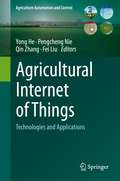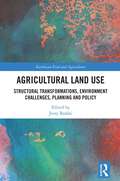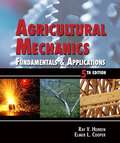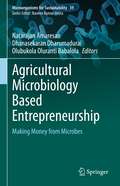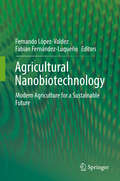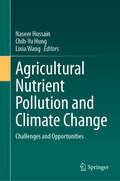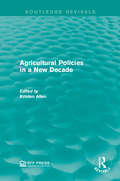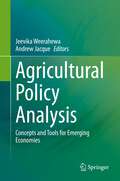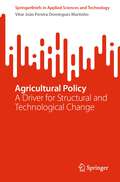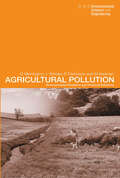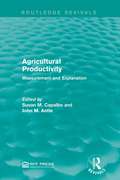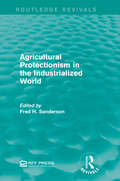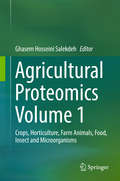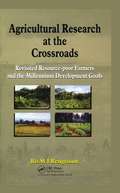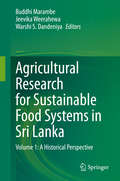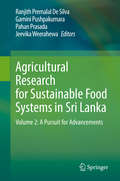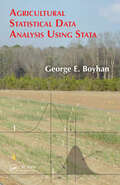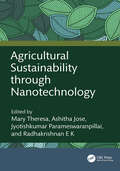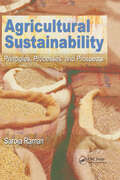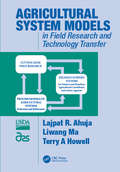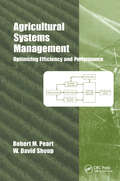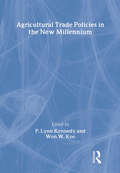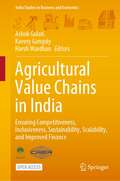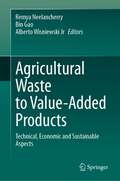- Table View
- List View
Agricultural Internet of Things: Technologies and Applications (Agriculture Automation and Control)
by Fei Liu Qin Zhang Yong He Pengcheng NieInternet of things (IoT) is a new type of network that combines communication technology, expanded applications, and physical devices. Among them, agriculture is one of the most important areas in the application of the IoT technology, which has its unique requirements and integration features. Compared to the information technology in traditional agriculture, the agricultural IoT mainly refers to industrialized production and sustainable development under relatively controllable conditions. Agricultural IoT applies sensors, RFID, visual capture terminals and other types of sensing devices to detect and collect site information, and with broad applications in field planting, facility horticulture, livestock and poultry breeding, aquaculture and agricultural product logistics. It utilizes multiple information transmission channels such as wireless sensor networks, telecommunications networks and the internet to achieve reliable transmission of agricultural information at multiple scales and intelligently processes the acquired, massive information. The goals are to achieve (i) optimal control of agricultural production process, (ii) intelligent electronic trading of agricultural products circulation, and (iii) management of systematic logistics, quality and safety traceability. This book focuses on three levels of agricultural IoT network: information perception technology, information transmission technology and application technology.
Agricultural Land Use: Structural Transformations, Environment Challenges, Planning and Policy (Earthscan Food and Agriculture)
by Jerzy BańskiThis book presents contemporary trends and challenges in agricultural land use, drawing on an array of global case studies.This volume examines agricultural land use through a three-pronged approach: structural transformations, environmental challenges, and planning and policy. Reflecting the global relevance of contemporary challenges to agricultural land use, the book presents a wide range of novel case studies from across the world, including Poland, Hungary, Denmark, Slovenia, Czechia, Tanzania, Uganda, South Africa, Algeria, Northeast Africa countries, China, India, Australia, New Zealand, USA, and Brazil. Each chapter focuses on a particular issue related to agricultural land use in that country or region, including land fragmentation, reduction of crop land, agricultural intensification, desertification of soils, climate change, biodiversity loss, traditional agricultural systems, urbanization and rural development, and planning challenges for agricultural land. Together the chapters present a global view of the challenges facing the agricultural industry and offer solutions for developing sustainable agricultural practices to ensure food security and environmental and biodiversity conservation.This book will be of great interest to students and scholars of food and agriculture, land use and land management, rural studies, and sustainable development.
Agricultural Mechanics: Fundamentals & Applications
by Ray V. HerrenA text for students learning basic mechanical skills in high school and postsecondary programs in agriscience, production agriculture, agribusiness, ornamental horticulture, and agricultural mechanics. Treatment begins with information on careers, then provides instruction on basic mechanical skills and applications. Covers use of hand tools, power tools, and stationary power equipment with numerous materials, touching on processes of wood- and metalworking, electric and gas welding, electrical wiring, robotics, plumbing, and construction. Includes color photos of male and female students, and 54 project plans. This fourth edition is revised to reflect the latest developments in the field. Annotation c. Book News, Inc., Portland, OR (booknews.com)
Agricultural Microbiology Based Entrepreneurship: Making Money from Microbes (Microorganisms for Sustainability #39)
by Olubukola Oluranti Babalola Natarajan Amaresan Dhanasekaran DharumaduraiThis book is first part of the 3 volume set focusing on basic and advanced methods for using microbiology as an entrepreneurial venture. This volume explains the entrepreneurship skills for production, cost-benefit analysis and marketing of bio-fertilizers, bio-pesticides, bio-insecticides, seaweed liquid biofertilizer, and phosphate solubilizers. Chapters cover the applications of microorganisms in small and large scale production to achieve a sustainable output. The book provides essential knowledge and working business protocols from all related disciplines in agribusiness, organic farming, and economic integration. This book is useful to graduate students, research scholars and postdoctoral fellows, and teachers who belong to different disciplines via Botany, Agriculture, Environmental Microbiology and Biotechnology, Plant Pathology, and Horticulture. Next two volumes are focused on food and industrial microbiology.
Agricultural Nanobiotechnology: Modern Agriculture for a Sustainable Future
by Fernando López-Valdez Fabián Fernández-LuqueñoNanobiotechnology in agriculture is a new knowledge area that offers novel possibilities to achieve high productivity levels at manageable costs during the production and merchandising of crops. This book shows us how we can use the cutting-edge knowledge about agriculture, nanotechnology, and biotechnology to increase the agricultural productivity and shape a sustainable future in order to increase the social welfare in rural areas and preserve the environmental health. Specialists from several countries will provide their feedback on a range of relevant topics such as environment-friendly use of nanofertilisers, nanodevices, nano-food packaging, nanocoating and nanocarriers and their relationship with the modern agriculture.
Agricultural Nutrient Pollution and Climate Change: Challenges and Opportunities
by Lixia Wang Naseer Hussain Chih-Yu HungThis book presents a comprehensive exploration of advanced scientific techniques for reducing agricultural nutrient pollution in the context of climate change. It delves into the sources, pathways, and extent of nutrient release into the environment, offering stakeholders valuable insights into how scientific advancements can help reduce environmental footprints. The authors critically examine key knowledge gaps, policy interventions, and challenges related to nutrient management from agrochemicals, synthetic fertilizers, and organic manures. As the demand for safe, sustainable, and environmentally friendly agricultural practices grows in the face of climate change, this book synthesizes scientific research, reports, and policies. It provides reliable information for scientists, students, policymakers, and organizations to promote effective nutrient utilization in agriculture while minimizing environmental impacts.
Agricultural Policies in a New Decade (Routledge Revivals)
by Kristen AllenAgricultural Policies in a New Decade was written in preparation for the 1990 Farm Bill in the United States in collaboration with the Food and Agriculture Committee of the National Planning Association. Originally published in the same year, this study aims to inform on the key issues affecting the new bill including budget austerity, the effects of agriculture on environmental quality, the safety and security of the U.S. food supply and international markets and trade policy. This title will be of interest to students of Environmental Studies and policy makers.
Agricultural Policy Analysis: Concepts and Tools for Emerging Economies
by Jeevika Weerahewa Andrew JacqueThis book is centred around various interwoven topics which are fundamental to policy analysis in agriculture. Key concepts and tools that are fundamental for the analysis of agricultural policies and programmes are presented. Key concepts introduced include, the role of the state in a market economy with examples from the Sri Lankan and other developing economies, the international trade environment, and conceptual frameworks for analysing important domestic and international trade policies. It also highlights interconnections among agriculture, development, policy and illustrates the extent to which the agricultural sector contributes in achieving economic growth objectives, equity and equality objectives and environmental objectives. The book takes the readers through the nature of agricultural markets in developing countries, with special emphasis on Sri Lanka, and illustrates how the degree of competitiveness is measured at various market levels using multiple indices and methods. Several tools, with accompanying case studies, for the analysis of policies and programmes are detailed. These tools include the GTAP model, gravity models, extended benefit cost analysis, and linear programming. Tools and models are applied to the analysis of trade policies and agreements, marketing policies, environmental services, extension programmes, land tenure reforms and climate change adaptations. Case studies in relation to the agri-food policy and strategy response to COVID-19 Pandemic are also covered. This book is of interest to public officials working in agricultural planning and agricultural policy, teachers, researchers, agro-economists, capacity builders and policymakers. Also the book serves as additional reading material for undergraduate and graduate students of agriculture, development studies, and environmental sciences. National and international agricultural scientists, policy makers will also find this to be a useful read.
Agricultural Policy: A Driver for Structural and Technological Change (SpringerBriefs in Applied Sciences and Technology)
by Vítor João MartinhoThis book gives insights into the agricultural policies in several countries located in different continents. It is of interest to students, researchers, and policy and decision makers.Given the particularities of agriculture, agricultural policies are indispensable for an adjusted development of farms according to the strategic objectives of each country, namely the socio-economic and environmental ones. The question that often arises is whether the practical effects of the various policy measures are in accordance with their design and what is the effect of these policy instruments among many other causes of structural and technological change. The aim of this book is to describe the main agricultural policies that have been implemented in countries such as the United States of America, Brazil, China, India, South Africa, Australia, as well as the European Union. It also aims to analyse the real impact of these policies on the structural and technological changes of farms in the European Union. As its methodology, the book considers bibliometric analysis, literature review and statistical approaches.
Agricultural Policy: Farm Programs and National Welfare
by Rainer SchickeleThis book is written for the student of rural America, be he farmer, businessman, labor leader, public servant, college student, or instructor, anyone who is curious to understand what problems farmers are facing in their relations to an industrial world, and what the government is doing to help them meet these problems.
Agricultural Pollution: Environmental Problems and Practical Solutions
by R. Parkinson Graham Merrington Dr Linton Nfa Mark Redman L. WinderThis comprehensive text provides a concise overview of environmental problems caused by agriculture, (such as pesticide pollution and increased nitrate levels) and offers practical solutions to them. It is well illustrated and contains a fully-referenced introduction to the main contemporary agricultural pollution issues in the UK. It will help pro
Agricultural Productivity: Measurement and Explanation (Routledge Revivals)
by John M. Antle Susan M. CapalboThis book, first published in 1988, provides a comprehensive, integrated body of knowledge concerning agricultural productivity research, highlighting both its strengths and limitations. This book will be of value to scholars and research leaders for the knowledge it conveys of future productivity research, and will also be of interest to students of environmental studies.
Agricultural Protectionism in the Industrialized World (Routledge Revivals)
by Fred H. SandersonOriginally published in 1990, Agricultural Protectionism in the Industrialized World takes a detailed look into the domestic and international agricultural policies of the United States, Europe, Canada, Japan, Australia and New Zealand. These areas are some of the most industrialised in the world and this study focuses on the benefits, policies and costs related to protectionism of their agriculture. These papers offer detailed analysis of the evolution, objections and domestic and international implications related to agriculture in specific countries as well as taking a global view of issues such as policy, trends and costs and concluding with a discussion on the effects of free trade. This title will be of interest to students of environmental studies.
Agricultural Proteomics Volume 2: Crops, Horticulture, Farm Animals, Food, Insect and Microorganisms
by Ghasem Hosseini SalekdehThis book will cover several topics to elaborate how proteomics may contribute in our understanding of mechanisms involved in stress adaptation. The knowledge being accumulated by a wide range of proteomics technologies may eventually be utilized in breeding programs to enhance stress tolerance. This book presents comprehensive reviews about responses of crop and farm animals to environmental stresses. Challenges related to stress phenotyping and integration of proteomics and other omics data have also been addressed.
Agricultural Research at the Crossroads: Revisited Resource-poor Farmers and the Millennium Development Goals
by Bo M. I. BengtssonIt is necessary to integrate field data relevant to policy with a global overview with up-to-date information for synthesis into scenarios and a vision of how future research and development in agriculture can best help those who are most needy and have little access to productive resources. The overall task is a huge challenge for policy-makers and the agricultural research establishment. It is also of concern in teaching agricultural students to be able to respond to future challenges. This publication is an attempt to stimulate discussion on future options of research policy, suggesting changes of agricultural R&D for societal development in accordance with the Millennium Development Goals.
Agricultural Research for Sustainable Food Systems in Sri Lanka: Volume 1: A Historical Perspective
by Buddhi Marambe Jeevika Weerahewa Warshi S. DandeniyaA food system comprises the entire range of actors and interlinked activities related to food production, processing, distribution, marketing and trade, preparation, consumption, and disposal. When a food system operates without compromising the needs of future generations, it is considered to be a “Sustainable Food System.” The present-day food systems in Sri Lanka are diverse, and the natural and physical environment, infrastructure, institutions, society and culture, and policies and regulations within which the food systems operate, as well as the technologies employed, have shaped their outcomes. Agricultural research is a key factor in terms of innovation and technological advances. Innovation has been the main driver of food systems’ transformation over the past few decades and will be critical to addressing the needs of a rapidly growing population in a context of climate change and scarcity of natural resources. In addition, agricultural research must help meet the rising demand for food at affordable prices. Comprising 17 chapters written by specialist(s) in their respective subject-areas, this Contributed Volume on “Agricultural Research for Sustainable Food Systems in Sri Lanka: A Historical Perspective” shares the scientific knowledge accumulated by the National Agricultural Research System of Sri Lanka, including universities, and offers recommendations on how to make food systems more sustainable in order to address the current needs of Sri Lankan society. It presents perspectives on four key thematic areas, namely: (i) Crop and animal production, management, and improvement, (ii) Agro-product processing technologies, (iii) Natural resource management, and (iv) Socio-economic development and agri-business management.
Agricultural Research for Sustainable Food Systems in Sri Lanka: Volume 2: A Pursuit for Advancements
by Jeevika Weerahewa Ranjith Premalal De Silva Gamini Pushpakumara Pahan PrasadaFood systems involve a range of activities concerning food production, processing, distribution, marketing and trade, preparation, consumption and disposal. They encompass the path of food from the farm to the dinner table, meeting the food and nutritional needs of a nation. When such systems do so without sacrificing the needs of future generations, they are referred to as “Sustainable Food Systems.” The natural and physical environment, infrastructure, institutions, society and culture, and policies and regulations within which they operate, as well as the technologies they adopt, shape these systems’ outcomes. Making food systems more sustainable is a key priority for all nations, and Sri Lanka is no exception. Food systems deliver optimal performance when the policy and regulatory environment is conducive, institutions are supportive, and a combination of agricultural research investments and an efficient extension system generates the technologies and scientific evidence required for sound policymaking and agenda setting. Further, agricultural research can generate essential findings, technologies and policies for sustainable agricultural development – across disciplines, sectors and stakeholder groups. This book shares valuable insights into research conducted in the broad food and agriculture sectors in Sri Lanka. It also discusses the status quo in related disciplines, and outlines future research directions. Accordingly, it offers a valuable source of reference material for researchers, students, and stakeholders in the food and agriculture sectors, while also highlighting the types of support that policymakers and other decision-makers can provide.
Agricultural Statistical Data Analysis Using Stata
by George BoyhanPractical statistics is a powerful tool used frequently by agricultural researchers and graduate students involved in investigating experimental design and analysis. One of the most widely used statistical analysis software packages for this purpose is Stata. The Stata software program has matured into a user-friendly environment with a wide variet
Agricultural Sustainability through Nanotechnology
by Jyotishkumar Parameswaranpillai Ashitha Jose Theresa, Mary E K RadhakrishnanAgricultural Sustainability through Nanotechnology focuses on the innovative intersection of agriculture and nanotechnology, offering a comprehensive exploration of how nanotechnological applications are revolutionizing sustainable farming practices. This book is a pioneering work that not only elucidates the immense potential of nanotechnology in agriculture but also provides practical insights into its implementation for enhanced sustainability.With a focus on addressing pressing agricultural challenges, this book sets itself apart by bridging the gap between cutting-edge nanotechnology research and its real-world applications in sustainable agriculture for better productivity. Readers will discover a wealth of knowledge on how nanotechnology can optimize crop production, mitigate environmental impacts, and improve resource efficiency in farming practices.This book is essential reading for researchers, academics, and professionals in the fields of agriculture, nanotechnology, and environmental science. It serves as a valuable resource for readers seeking to understand and harness the momentum of nanotechnology for sustainable agricultural practices.
Agricultural Sustainability: Principles, Processes, and Prospects
by Saroja RamanTake a balanced look at ways to ensure food security and to work to erase hunger around the worldAgriculture is the most aggressively managed ecosystem. Agricultural Sustainability: Principles, Processes, and Prospects provides a comprehensive examination of all facets of agricultural sustainability, beginning with the history of the evolution of the concept to the present. Challenges to sustainability are clearly presented along with practical strategies to counter prospective problems. This vital resource considers options for the future, as well as reviewing past approaches for their value in today’s world.When one considers that the alternative to agricultural sustainability is the collapse of the world’s food systems, it is understood that compromise is impossible. Agricultural Sustainability takes a holistic approach to the issues that are involved in making agriculture ecologically sound, economically viable, and socially responsible around the world. The book is divided into three parts. Part One clarifies the concept of agricultural sustainability, bringing a rational and balanced view of the core elements. Part Two discusses ways to promote sustainability in the world, including practical scientific and technological processes for improving yields while ensuring food security for future generations. Part Three peers into future decades, reviewing the vision documents of international agencies, their perceptions and expectations for the years ahead, and present dysfunctional aspects in the current food system. The book is extensively referenced and includes figures and charts to clearly explain data.The book examines: the historic evolution of the concept of agricultural sustainability the combined effects of a multiplicity of agricultural systems concepts for validating the sustainability of a production system the role of natural capital in production the role of science and technology in sustainable use managing land, water, biodiversity, and energy quantitative approaches to measuring agricultural sustainability the current status of agricultureand predictions for its growth in the coming decades case studies of agricultural growth from India and China problemsand possibilitiesof creating a hunger-free world by the end of this century Agricultural Sustainability is crucial, enlightening reading for field workers in NGOs and agricultural extensions; personnel in local, national, and international developmental organizations; and educators and students of sustainable agricultural production, food security, rural development, environmental science, and the conservation of natural resources.
Agricultural System Models in Field Research and Technology Transfer
by Liwang Ma Lajpat R. Ahuja Terry A. HowellMost books covering the use of computer models in agricultural management systems target only one or two types of models. There are few texts available that cover the subject of systems modeling comprehensively and that deal with various approaches, applications, evaluations, and uses for technology transfer. Agricultural System Models in Field Res
Agricultural Systems Management: Optimizing Efficiency and Performance
by Robert M. Peart; W. David ShoupRunning a productive agriculture system has always been about having the right tools and the know-how to pursue optimization and efficiency. In the 21st century, the case can be made that the agriculturist's most important tool is not the cultivator, but the computer. While you still need to know how to adapt to the day-to-day challenges of land an
Agricultural Trade Policies in the New Millennium
by P. Lynn Kennedy Andrew D O'Rourke Won W KooFace the challenge of change in the global agricultural trade market!This insightful book presents a comprehensive overview of the trade situation facing agriculture in the 21st century. This esteemed collection of the field?s foremost researchers evaluates anticipated changes to the agricultural trade market and the competitiveness of commodities and products resulting from existing and potential international policies. Agricultural Trade Policies in the New Millennium provides an in-depth understanding of multilateral trade negotiations (past, present, and future) and the impact of regionalism on agricultural trade. It also analyzes trade issues specific to individual commodities, such as rice, wheat, and cotton.Agricultural Trade Policies in the New Millennium consolidates essential trade research into a one-of-a-kind reference source for economists, academics, and agriculture professionals. The book provides a detailed overview of current and potential trade situations, divided into three concise sections: key issues influencing trade negotiations from the perspective of developed and developing countries and the environment; commodity trade and trade policy issues concerning competitiveness and the international policy environment for coarse grains, cotton, rice, sugar, and wheat; and general issues related to multilateral and regional trade agreements, including policy tools within the World Trade Organization, anti-dumping actions, regionalism, price volatility, and the macroeconomic effects of trade liberalization. Agricultural Trade Policies in the New Millennium examines: key issues influencing trade negotiations commodity trade and trade policy issues issues and concerns related to multilateral and regional trade negotiations challenges facing trade policy prospects for the agricultural sector in the new millennium With international policy issues like the WTO’s Millennium Round and the Free Trade Area of the Americas (FTAA) in negotiation and a new United States farm bill pending, Agricultural Trade Policies in the New Millennium provides much-needed textbook analysis by expert researchers. This vital book will keep you in touch with current trade negotiations and policy decisions that are certain to hold major implications for the agricultural sector.
Agricultural Value Chains in India: Ensuring Competitiveness, Inclusiveness, Sustainability, Scalability, and Improved Finance (India Studies in Business and Economics)
by Harsh Wardhan Ashok Gulati Kavery GangulyThis open access book provides a clear holistic conceptual framework of CISS-F (competitiveness, inclusiveness, sustainability, scalability and access to finance) to analyse the efficiency of value chains of high value agricultural commodities in India. It is based on the understanding that agriculture is an integrated system that connects farming with logistics, processing and marketing. Farmer’s welfare being central to any agricultural policy makes it very pertinent to study how a value chain works and can be strengthened further to realize this policy goal. This book adds value to the existing research by studying the value chains end-to-end across a wide spectrum of agricultural commodities with the holistic lens of CISS-F. It is not enough that a value chain is competitive but not inclusive or it is competitive and inclusive but not sustainable. The issue of scalability is very critical to achieve macro gains in terms of greater farmer outreach and sectoral growth. The research undertaken here brings out some very useful insights for policymaking in terms of what needs to be done better to steer the agricultural value chains towards being more competitive, inclusive, sustainable and scalable. The value chain specific research findings help draw very nuanced policy recommendations as well as present a big picture of the future direction of policy making in agriculture.
Agricultural Waste to Value-Added Products: Technical, Economic and Sustainable Aspects
by Bin Gao Remya Neelancherry Alberto Wisniewski JrThis edited book provides a comprehensive review of the current agricultural waste disposal techniques focusing on the ongoing research in the production of various agro waste-derived value-added products. Further topic includes the techno-economic aspects in up-scaling the technology from lab scale to commercial/pilot scale. Sustainable waste management and alternative renewable energy sources are the most important requirements in this era of rapid industrialization and urbanization. Agricultural waste, which is one of the major contributors to overall waste production, has the ability to be an essential source of renewable energy and other valuable products. The ongoing research and technical advancements in agro-waste treatment lead to the efficient conversion of waste into different value-added products. This book is of primary interest to academicians, researchers, scientists and engineers working in the field of agro-residue management, and biomass to bio-energy conversion technologies. Also, the book serves as reading material for students of Environmental Engineering/Civil and Environmental Engineering and Agricultural Engineering. Rural Management authorities, Industrial and Government policy-making agencies may also find it useful read.
